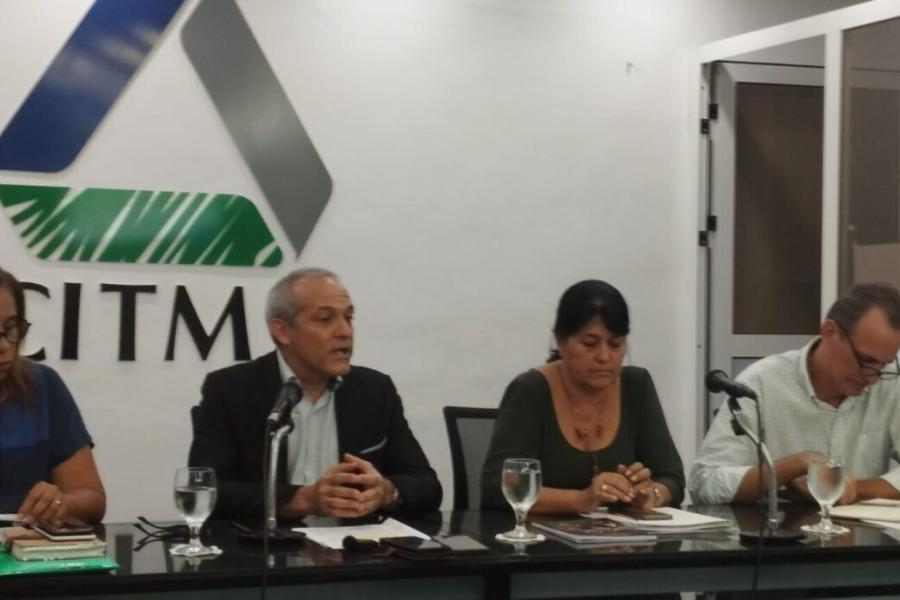
Cuba introduces regulations for participation in carbon markets
Cuba published Resolution 106/2025 in Official Gazette No. 77, establishing the basis for the country's participation in the carbon market (CM), consistent with national strategies, legal instruments, and plans, with the aim of promoting the reduction of greenhouse gas (GHG) emissions and contributing to the fulfillment of its international environmental commitments.
The information was released at a press conference chaired by Armando Rodríguez Batista, Minister of Science, Technology, and Environment (Citma); Adianez Taboada, Deputy Minister; Odalys Goicochea, Director General of the Environment; Daimar Cánovas, Legal Director; and Jessica Fernández, Director of Natural Resources, Prioritized Ecosystems, and Climate Change.
According to Rodríguez Batista, the regulation is based on current environmental legislation, Law 150 of the Natural Resources and Environment System, Decree 86 on Combating Climate Change, the State Plan "Tarea Vida" (Life Task), and, very importantly, Cuba's Nationally Determined Contribution, the country's main climate commitment under the United Nations Framework Convention on Climate Change and the Paris Agreement.
The minister referred to the process deployed after the Council of Ministers approved Cuba's entry into the carbon markets on February 25th to create the enabling framework for Cuba. This process was led by Citma (National Commission for the Environment) with the support of other Central Government agencies, scientific institutions, and civil society.
He emphasized that the rigorous and participatory process, which also received support from international collaboration through the United Nations Development Program, was able to be carried out expeditiously thanks to the country's investment in human capital development.
“This regulation makes Cuba an active player in the global climate economy, prioritizing sustainability and social justice, inherent to our socialist system,” said Rodríguez Batista.
Odalys Goicochea Cardoso, Director General of the Environment at Citma, referred to the steps taken by Cuba internationally and nationally to fulfill its climate commitments with the approval of relevant environmental policies that support participation in the carbon market.
She explained that carbon credits are systems for buying and selling carbon credits that represent the reduction, elimination, or avoidance of the emission of one ton of carbon dioxide equivalent (CO2e) from the atmosphere. Their objective is to create economic incentives to reduce greenhouse gas emissions and combat climate change.
When talking about carbon markets, he said, it's not just about the environmental benefits they generate through the preservation of nature, the protection of natural resources, or the issue of biological diversity, but rather they reflect "the synergy this motto has with a group of environmental, scientific, and climate policies we have in our country, which... further strengthens the management we will be doing in carbon markets."
In this regard, he referred to how it relates to what Cuba has been doing in the protection and sustainable use of biological resources, with the strategy for transitioning toward a circular economy and the approach to circularity, which contributes to a reduction in greenhouse gases, and with the reduction in the use of plastics, whose waste contributes to the increase in average global temperatures. These are all consistent with the strategic axes of the National Economic and Social Development Plan and the State Plan to Combat Climate Change—Tarea Vida.
In addition to the environmental and natural benefits, Goicochea highlighted the social benefits that can be brought by joining the MC, based on access to and transfer of efficient technologies, the creation of green jobs, and the improvement of our communities where the main ecosystems and natural resources are located.
Regarding the new regulation, the legal director of CITMA indicated that Resolution 106/2025 of that organization has seven chapters. The first, containing general provisions, establishes its scope: individuals and legal entities, national or foreign, public or private, and its main objective: to establish the basis for the country's participation in MC activities, thereby promoting the reduction of greenhouse gas emissions (GHGs) and contributing to compliance with the Nationally Determined Contribution (NDC) in a manner consistent with the priorities of sustainable economic and social development.
The regulation establishes the operating principles of the MC, including state sovereignty over natural resources; integrity; and transparency; validation and verification by independent third parties, the actions of acCarbon offsets include the validation and verification of mitigation activities by independent third parties; additionality, the reductions or removals of greenhouse gas emissions from the mitigation activity; permanence, the reductions or removals of GHG emissions from the mitigation activity; robust quantification of emission reductions and removals; the prohibition of double counting; and the contribution to sustainable development.
Vice Minister Adianez Taboada presented the Carbon Market Technical Unit, a new entity of the Center for Energy Information Management and Development (CUBAENERGIA) of the Nuclear Energy and Advanced Technologies Agency (AENTA).
This unit's functions will include ensuring the alignment of the initiatives and projects under analysis with the country's policy framework; guaranteeing that proposals submitted for approval ensure due compliance and transparency, in accordance with international standards for the carbon market; ensuring that projects generate real GHG reductions and are certified under the responsibility of the proposing agency; Ensure that proposals are based on the National Greenhouse Gas Inventory.
The full text of the new Cuban regulations signed by the Minister of Citma can be found in the Official Gazette published on September 19: gacetaoficial.gob.cu/es



